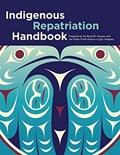Narrow Results By
Canadian law and indigenous self-determination : a naturalist analysis
https://archives.whyte.org/en/permalink/catalogue25724
- Medium
- Library - Book (including soft-cover and pamphlets)
- Published Date
- 2019
- Author
- Christie, Gordon
- Publisher
- Toronto ; Buffalo ; London : University of Toronto Press
- Call Number
- 07.2 C46c
- Author
- Christie, Gordon
- Publisher
- Toronto ; Buffalo ; London : University of Toronto Press
- Published Date
- 2019
- Physical Description
- vi, 440 pages ; 23 cm
- Abstract
- For centuries, Canadian sovereignty has existed uneasily alongside forms of Indigenous legal and political authority. Canadian Law and Indigenous Self-Determination demonstrates how, over the last few decades, Canadian law has attempted to remove Indigenous sovereignty from the Canadian legal and social landscape. Adopting a naturalist analysis, Gordon Christie responds to questions about how to theorize this legal phenomenon, and how the study of law should accommodate the presence of diverse perspectives. Exploring the socially-constructed nature of Canadian law, Christie reveals how legal meaning, understood to be the outcome of a specific society, is being reworked to devalue the capacities of Indigenous societies. Addressing liberal positivism and critical postcolonial theory, Canadian Law and Indigenous Self-Determination considers the way in which Canadian jurists, working within a world circumscribed by liberal thought, have deployed the law in such a way as to attempt to remove Indigenous meaning-generating capacity. -- Provided by publisher.
- Contents
- Setting the stage -- Canadian law and its puzzles -- Differing understandings and the way forward -- Remarks on theorizing and method -- Problems with theorizing about the law -- Liberal positivism and aboriginal rights -- Characterizing and defining 'existing' aboriginal rights -- The place of aboriginal rights in Canada -- Postcolonial theory and aboriginal law.
- ISBN
- 9781442628991
- Accession Number
- P2023.12
- Call Number
- 07.2 C46c
- Collection
- Archives Library
This material is presented as originally created; it may contain outdated cultural descriptions and
potentially offensive content.
Read more.
Exactly what I said : translating words and worlds
https://archives.whyte.org/en/permalink/catalogue25707
- Medium
- Library - Book (including soft-cover and pamphlets)
- Published Date
- 2022
- Author
- Yeoman, Elizabeth
- Publisher
- Winnipeg, Manitoba, Canada : University of Manitoba Press
- Call Number
- 07.2 Y4e
- Author
- Yeoman, Elizabeth
- Publisher
- Winnipeg, Manitoba, Canada : University of Manitoba Press
- Published Date
- 2022
- Physical Description
- 276 pages : illustrations, map ; 23 cm
- Subjects
- Indigenous
- Indigenous Culture
- Indigenous Peoples
- Indigenous Traditions
- Language
- Translation
- Abstract
- 'You don't have to use the exact same words.... But it has to mean exactly what I said.' Thus began the ten-year collaboration between Innu elder and activist Tshaukuesh Elizabeth Penashue and Memorial University professor Elizabeth Yeoman that produced the celebrated Nitinikiau Innusi: I Keep the Land Alive, an English-language edition of Penashue's journals, originally written in Innu-aimun during her decades of struggle for Innu sovereignty. Exactly What I Said: Translating Words and Worlds reflects on that collaboration and what Yeoman learned from it. It is about naming, mapping, and storytelling; about photographs, collaborative authorship, and voice; about walking together on the land and what can be learned along the way. Combining theory with personal narrative, Yeoman weaves together ideas, memories, and experiences--of home and place, of stories and songs, of looking and listening--to interrogate the challenges and ethics of translation. Examining what it means to relate whole worlds across the boundaries of language, culture, and history, Exactly What I Said offers an accessible, engaging reflection on respectful and responsible translation and collaboration.-- Provided by publisher.
- Contents
- Introduction -- Mapping -- Walking -- Stories -- Looking -- Signs -- Literacies -- Listening -- Songs -- Wilderness
- ISBN
- 9780887552731
- Accession Number
- P2023.07
- Call Number
- 07.2 Y4e
- Collection
- Archives Library
This material is presented as originally created; it may contain outdated cultural descriptions and
potentially offensive content.
Read more.
In good relation : history, gender, and kinship in indigenous feminisms
https://archives.whyte.org/en/permalink/catalogue25712
- Medium
- Library - Book (including soft-cover and pamphlets)
- Published Date
- 2020
- Publisher
- Winnipeg, Manitoba, Canada : University of Manitoba Press
- Call Number
- 07.2 N53i
- Responsibility
- Edited by Sarah Nickel and Amanda Fehr
- Publisher
- Winnipeg, Manitoba, Canada : University of Manitoba Press
- Published Date
- 2020
- Physical Description
- 260 pages : illustrations ; 23 cm
- Subjects
- Indigenous
- Indigenous Culture
- Indigenous Peoples
- Indigenous Traditions
- Women
- Feminism
- Gender
- Sexuality
- Abstract
- Over the past thirty years, a strong canon of Indigenous feminist literature has addressed how Indigenous women are uniquely and dually affected by colonialism and patriarchy. Indigenous women have long recognized that their intersectional realities were not represented in mainstream feminism, which was principally white, middle-class, and often ignored realities of colonialism. As Indigenous feminist ideals grew, Indigenous women became increasingly multi-vocal, with multiple and oppositional understandings of what constituted Indigenous feminism and whether or not it was a useful concept. Emerging from these dialogues are conversations from a new generation of scholars, activists, artists, and storytellers who accept the usefulness of Indigenous feminism and seek to broaden the concept. In Good Relation captures this transition and makes sense of Indigenous feminist voices that are not necessarily represented in existing scholarship. There is a need to further Indigenize our understandings of feminism and to take the scholarship beyond a focus on motherhood, life history, or legal status (in Canada) to consider the connections between Indigenous feminisms, Indigenous philosophies, the environment, kinship, violence, and Indigenous Queer Studies. Organized around the notion of "generations," this collection brings into conversation new voices of Indigenous feminist theory, knowledge, and experience. Taking a broad and critical interpretation of Indigenous feminism, it depicts how an emerging generation of artists, activists, and scholars are envisioning and invigorating the strength and power of Indigenous women. -- Provided by publisher
- Contents
- Introduction / Sarah Nickel -- Broadening indigenous feminisms. The uninvited / by Jana-Rae Yerxa -- Us / by Elaine McArthur -- Making matriarchs at Coqualeetza : Sto´:lo¯ women's politics and histories across generations / by Madeline Rose Knickerbocker -- Sa´mi feminist moments : decolonization and Indigenous feminism / by Astri Dankertsen -- "It just piles on, and piles on, and piles on" : young Indigenous women and the colonial imagination / by Tasha Hubbard with Joi T. Arcand, Zoey Roy, Darian Lonechild, and Marie Sanderson -- "Making an honest effort" : Indian homemakers' clubs and complex settler engagements / by Sarah Nickel -- Queer and two-spirit identities, and sexuality. Reclaiming traditional gender roles : a two-spirit critique / by Kai Pyle -- Reading Chrystos for feminisms that honour two-spirit erotics / by Aubrey Jean Hanson -- Naawenangweyaabeg Coming in : intersections of Indigenous sexuality and spirituality / by Chantal Fiola -- Morning star, and moon share the sky : (re)membering two-spirit identity through culture-centred HIV prevention curriculum for Indigenous youth / by Ramona Beltra´n, Antonia R.G. Alvarez, and Miriam M. Puga -- Multi-generational feminisms and kinship. Honouring our great-grandmothers : an ode to Caroline LaFramboise, twentieth-century Me´tis matriach / by Zoe Todd -- on anishinaabe parental kinship with black girl life : twenty-first century ([de]colonial) turtle island / by waaseyaa'sin christine sy with aja sy -- Toward an Indigenous relational aesthetics : making Native love, still / by Lindsay Nixon -- Conversations on Indigenous feminism / by Omeasoo Wa¯hpa¯siw and Louise Halfe -- These are my daughters / by Anina Major.
- ISBN
- 9780887558511
- Accession Number
- P2023.09
- Call Number
- 07.2 N53i
- Collection
- Archives Library
This material is presented as originally created; it may contain outdated cultural descriptions and
potentially offensive content.
Read more.
Indigenous repatriation handbook
https://archives.whyte.org/en/permalink/catalogue26210
- Medium
- Library - Book (including soft-cover and pamphlets)
- Published Date
- 2019
- Publisher
- Victoria, BC : Royal British Columbia Museum
- Call Number
- 07.2 C69i
- Responsibility
- Prepared by Jisang Nika Collison, Sdaahl K'awaas Lucy Bell, and Lou-ann Neal
- Publisher
- Victoria, BC : Royal British Columbia Museum
- Published Date
- 2019
- Physical Description
- 162 pages ; 6 cm
- Abstract
- A reference for BC Indigenous communities and museums, created by and for Indigenous people working in repatriation. -- From back cover
- Contents
- 1. Introduction -- 2. Organizing a successful repatriation -- 3. Conducting research -- 4. Repatriation from the royal BC museum -- 5. Repatriation for other institutions -- 6. For institutions wishing to repatriate to Indigenous Peoples in BC -- 7. Case study: repatriation journey of the Haida Nation -- APPENDIX -- A. Glossary of terms -- B. Indigenous museums and cultural centres in Canada -- C. Organizational templates, procedures and examples -- D. Fundraising resouces -- E. Sample letters to museums -- F. Tips for planning for travel and transport -- G. Global museums with major indigenous collections from BC -- H. Resources on education in indigenous museology -- I. Frequently asked questions about repatriation -- J. Repatriation stories.
- ISBN
- 9780772673176
- Accession Number
- P2023.25
- Call Number
- 07.2 C69i
- Collection
- Archives Library
This material is presented as originally created; it may contain outdated cultural descriptions and
potentially offensive content.
Read more.
Indigenous resurgence in an age of reconciliation
https://archives.whyte.org/en/permalink/catalogue26196
- Medium
- Library - Book (including soft-cover and pamphlets)
- Published Date
- 2023
- Publisher
- Toronto [Ontario] ; Buffalo ; London : University of Toronto Press
- Call Number
- 07.2 St2i
- Responsibility
- Edited by Heidi Kiiwetinepinesiik Stark, Aime´e Craft, and Hokulani K Aikau
- Publisher
- Toronto [Ontario] ; Buffalo ; London : University of Toronto Press
- Published Date
- 2023
- Physical Description
- vi, 263 pages : illustrations ; 23 cm
- Subjects
- Indigenous Culture
- Indigenous Customs
- Indigenous People
- Indigenous Traditions
- Reconciliation
- Colonialism
- Identity
- Gender
- Abstract
- What would Indigenous resurgence look like if the parameters were not set with a focus on the state, settlers, or an achievement of reconciliation? Indigenous Resurgence in an Age of Reconciliation explores the central concerns and challenges facing Indigenous nations in their resurgence efforts, while also mapping the gaps and limitations of both reconciliation and resurgence frameworks. The essays in this collection centre the work of Indigenous communities, knowledge, and strategies for resurgence and, where appropriate, reconciliation. The book challenges narrow interpretations of indigeneity and resurgence, asking readers to take up a critical analysis of how settler colonial and heteronormative framings have infiltrated our own ways of relating to our selves, one another, and to place. The authors seek to (re)claim Indigenous relationships to the political and offer critical self-reflection to ensure Indigenous resurgence efforts do not reproduce the very conditions and contexts from which liberation is sought. Illuminating the interconnectivity between and across life in all its forms, this important collection calls on readers to think expansively and critically about Indigenous resurgence in an age of reconciliation.-- Provided by publisher.
- Contents
- Artist Statement / Lianne Marie Leda Charlie -- Introduction: Generating a Critical Resurgence Together / Heidi Kiiwetinepinesiik Stark-- Part 1: Realizing Resurgence Together. 1. Beyond the Grammar of Settler Apologies / Mishuana Goeman -- 2. Spirit and Matter: Resurgence as Rising and (Re)creation as Ethos / Dian Million -- 3. Removing Weeds so Natives Can Grow: A Metaphor Reconsidered / Hokulani K. Aikau -- 4. (Ad)dressing Wounds: Expansive Kinship Inside and Out / Dallas Hunt -- Part 2: Claiming Our Relationships to the Political. 5. Beyond Rights and Wrongs: Towards Resurgence of a Treaty-Based Ethic of Relationality / Gina Starblanket -- 6. Thawing the Frozen Rights Theory: On Rejecting Interpretations of Reconciliation and Resurgence That Define Indigenous Peoples as Frozen in a Pre-colonial Past / Aimée Craft -- 7. Nêhiyaw Hunting Pedagogies and Revitalizing Indigenous Laws / Darcy Lindberg -- Part 3: Narrating Reconciliation and Resurgence. 8. Thinking through Resurgence Together: A Conversation between Sarah Hunt/Tlalilila’ogwa and Leanne Betasamosake Simpson / Sarah Hunt/Tlalilila’ogwa and Leanne Betasamosake Simpson -- 9. Truth-Telling amidst Reconciliation Discourses: How Stories Reshape Our Relationships / Jeff Corntassel -- 10. Political Action in the Time of Reconciliation / Corey Snelgrove and Matthew Wildcat -- Part 4: Reconciling Lands, Bodies, and Gender. 11. Body Land, Water, and Resurgence in Oaxaca / Isabel Altamirano-Jiménez -- 12. To Respect Indigenous Territorial Protocol: Hosting the Olympic Games on Indigenous Lands in Settler Colonial Canada / Christine O’Bonsawin -- 13. “Descendants of the Original Lords of the Soil”: Gender, Kinship, and an Indignant Model of Métis Nationhood / Daniel Voth -- 14. Red Utopia / Billy-Ray Belcourt.
- ISBN
- 9781487544607
- Accession Number
- P2023.10
- Call Number
- 07.2 St2i
- Collection
- Archives Library
This material is presented as originally created; it may contain outdated cultural descriptions and
potentially offensive content.
Read more.
Me´tis rising : living our present through the power of our past
https://archives.whyte.org/en/permalink/catalogue26200
- Medium
- Library - Book (including soft-cover and pamphlets)
- Published Date
- 2022
- Publisher
- Vancouver, British Columbia : Purich Books
- Call Number
- 07.2 B71m
- Responsibility
- Edited by Yvonne Boyer and Larry Chartrand
- Publisher
- Vancouver, British Columbia : Purich Books
- Published Date
- 2022
- Physical Description
- viii, 275 pages : illustrations, maps ; 23 cm
- Abstract
- Me´tis Rising draws on a remarkable cross-section of perspectives to tell the histories, stories, and dreams of people from varied backgrounds, demonstrating that there is no single Me´tis experience - only a common sense of belonging and a commitment to justice. The contributors to this unique collection, most of whom are Me´tis themselves, examine often-neglected aspects of Me´tis existence in Canada. They trace a turbulent course, illustrating how Me´tis leaders were born out of the need to address abhorrent social and economic disparities following the Me´tis-Canadian war of 1885. They talk about the long and arduous journey to rebuild the Me´tis nation from a once marginalized and defeated people; their accounts ranging from personal reflections on identity to tales of advocacy against poverty and poor housing. And they address the indictment of the jurisdictional gap whereby neither federal nor provincial governments would accept governance responsibility towards Me´tis people. Me´tis Rising is an extraordinary work that exemplifies how contemporary Me´tis identity has been forged by social, economic, and political concerns into a force to be reckoned with."-- Provided by publisher.
- Contents
- Part 1: History, Identity, and Belonging -- River Water Flows through Our Veins / Leah Dorion and Curtis Breaton -- What's a Me´tis, Anyway? / Catherine Littlejohn -- The Right to Self-Identify as Me´tis at School / Jonathan Anuik -- Ancestral Knowledge in a Contemporary World / Yvonne Vizina -- Part 2: Leadership and Relationship Building -- Fire Starters and Keepers / Laura-Lee Bellehumeur-Kearns -- Finding a Way around the Jurisdictional Gaps / Tricia Logan -- Navigating Troubled Political Waters for Better Housing / Nathalie Kermoal -- Demanding the Right to Care for Their Own Children / Allyson Stevenson -- Part 3: Exercising Our Rights and Self-Determination -- Who Will Come to Bury You? / Paul Chartrand -- Wiichihiwayshinawn / Margaret Kress -- Stoking the Embers: A Story of Realizing Decolonizing Aims with the Me´tis through Media Agancy / Yvonne Poitras Pratt -- A Me´tis Woman's Journey of Discovery / Judith G. Bartlett
- ISBN
- 9780774880756
- Accession Number
- P2023.23
- Call Number
- 07.2 B71m
- Collection
- Archives Library
This material is presented as originally created; it may contain outdated cultural descriptions and
potentially offensive content.
Read more.
Unpapered : writers consider Native American identity and cultural belonging
https://archives.whyte.org/en/permalink/catalogue26195
- Medium
- Library - Book (including soft-cover and pamphlets)
- Published Date
- 2023
- Publisher
- Lincoln : University of Nebraska Press
- Call Number
- 07.2 G46u
- Responsibility
- Edited by Diane Glancy and Linda Rodriguez
- Publisher
- Lincoln : University of Nebraska Press
- Published Date
- 2023
- Physical Description
- xiv, 236 pages : illustrations ; 23 cm
- Subjects
- Indigenous Culture
- Indigenous Customs
- Indigenous People
- Indigenous Traditions
- History
- Turtle Island
- Identity
- Colonialism
- Abstract
- Unpapered is a collection of personal narratives by Indigenous writers exploring the meaning and limits of Native American identity beyond its legal margins. Native heritage is neither simple nor always clearly documented, and citizenship is a legal and political matter of sovereign nations determined by such criteria as blood quantum, tribal rolls, or community involvement. Those who claim a Native cultural identity often have family stories of tenuous ties dating back several generations. Given that tribal enrollment was part of a string of government programs and agreements calculated to quantify and dismiss Native populations, many writers who identify culturally and are recognized as Native Americans do not hold tribal citizenship. With essays by Trevino Brings Plenty, Deborah Miranda, Steve Russell, and Kimberly Wieser, among others, Unpapered charts how current exclusionary tactics began as a response to “pretendians”—non-indigenous people assuming a Native identity for job benefits—and have expanded to an intense patrolling of identity that divides Native communities and has resulted in attacks on peoples’ professional, spiritual, emotional, and physical states. An essential addition to Native discourse, Unpapered shows how social and political ideologies have created barriers for Native people truthfully claiming identities while simultaneously upholding stereotypes --Publisher's description.
- Contents
- Introduction / by Diane Glancy -- Show Your Papers. Paperwork / Kim Shuck -- Things you can do with your chart for calculating quantum of Indian blood / Deborah Miranda -- The white box / Kimberly L. Becker -- Seeking the Indian gravy train / Steve Russell -- Unpapered / Diane Glancy -- Finding the Way. On Chumash Land / Terra Trevor -- A salmon-fishing story / Abigail Chabitnoy -- Confessions of a detribalized mixed-blood / Jeanetta Calhoun Mish -- Thinking with Bigfoot about a Jackpine Savage : cryptogenealogical reflections / Carter Meland -- Identity Wars. "You don't look Indian" / Michele Leonard -- Pretend Indian exegesis : the pretend Indian uncanny valley hypothesis in literature and beyond / Trevino Brings Plenty -- Dead Indians. Live Indians. Legal Indians. / Ron Querry -- The animals' ballgame / Geary Hobson -- We never spoke / Linda Boyden -- Why We Matter. On being Chamorro and belonging to Guam / Craig Santos Perez -- Aunt Ruby's little sister dances / Kimberly Wieser -- Buffalo heads in diners : remnant populations / Denise Dotson Low -- And thus the tribes diminish / Linda Rodriguez.
- ISBN
- 9781496235008
- Accession Number
- P2023.15
- Call Number
- 07.2 G46u
- Collection
- Archives Library
This material is presented as originally created; it may contain outdated cultural descriptions and
potentially offensive content.
Read more.
Upholding Indigenous economic relationships : nehiyawak narratives
https://archives.whyte.org/en/permalink/catalogue25716
- Medium
- Library - Book (including soft-cover and pamphlets)
- Published Date
- 2023
- Author
- Wuttunee Jobin, Shalene
- Publisher
- Vancouver ; Toronto : UBC Press
- Call Number
- 07.2 W96u
- Author
- Wuttunee Jobin, Shalene
- Publisher
- Vancouver ; Toronto : UBC Press
- Published Date
- 2023
- Physical Description
- xv, 255 pages : illustrations ; 24 cm
- Abstract
- Upholding Indigenous Economic Relationships explains settler colonialism through the lens of economic exploitation, using Indigenous methodologies and critical approaches. What is the relationship between economic progress in the land now called Canada and the exploitation of Indigenous peoples? And what gifts embedded within Indigenous world views speak to miyo-pimâtisiwin, the good life, and specifically to good economic relations? Shalene Wuttunee Jobin draws on the knowledge systems of the nehiyawak (Plains Cree people) - whose distinctive principles and practices shape their economic behaviour - to make two central arguments. The first is that economic exploitation was the initial and most enduring relationship between newcomers and Indigenous peoples. The second is that Indigenous economic relationships are constitutive: connections to the land, water, and other human and nonhuman beings form who we are as individuals and as peoples. This groundbreaking study employs Cree narratives that draw from the past and move into the present to reveal previously overlooked Indigenous economic theories and relationships, and provides contemporary examples of nehiyawak renewing these relationships in resurgent ways. In the process, Upholding Indigenous Economic Relationships offers tools that enable us to reimagine how we can aspire to the good life with all our relations. -- Provided by publisher
- Contents
- 1. Grounding methods -- 2. Grounding economic relationships -- 3. nehiyawak peoplehood and relationality -- 4. Canada's genisis story -- 5. Warnings of insatiable greed -- 6. Indigenous women's lands and bodies -- 7. Theorizing Cree economic and governing relationships -- 8. Colonial dissonance -- 9. Principles guiding Cree economic relationships -- 10. Renewed relationships through resurgent practices --11. Upholding relations.
- ISBN
- 9780774865104
- Accession Number
- P2023.11
- Call Number
- 07.2 W96u
- Location
- Reading Room
- Collection
- Archives Library
This material is presented as originally created; it may contain outdated cultural descriptions and
potentially offensive content.
Read more.
Walking together, working together : engaging wisdom for indigenous well-being
https://archives.whyte.org/en/permalink/catalogue25722
- Medium
- Library - Book (including soft-cover and pamphlets)
- Published Date
- 2022
- Publisher
- Edmonton, Alberta : Polynya Press, an imprint of University of Alberta Press
- Call Number
- 07.2 J62w
- Responsibility
- Edited by Leslie Main Johnson and Janelle Marie Baker
- Publisher
- Edmonton, Alberta : Polynya Press, an imprint of University of Alberta Press
- Published Date
- 2022
- Physical Description
- xii, 304 pages : illustrations ; 23 cm.
- Abstract
- This collection takes a holistic view of well-being, seeking complementarities between Indigenous approaches to healing and Western biomedicine. Topics include traditional healers and approaches to treatment of disease and illness; traditional knowledge and intellectual property around medicinal plant knowledge; the role of diet and traditional foods in health promotion; culturally sensitive approaches to healing work with urban Indigenous populations; and integrating biomedicine, alternative therapies, and Indigenous healing in clinical practice. Throughout, the voices of Elders, healers, physicians, and scholars are in dialogue to promote Indigenous community well-being through collaboration. This book will be of interest to scholars in Indigenous Studies, medicine and public health, medical anthropology, and anyone involved with care delivery and public health in Indigenous communities. Contributors: Darlene Auger, Dorothy Badry, Margaret David, Meda DeWitt, Hal Eagletail, Gary L. Ferguson III, Marc Fonda, Annie Goose, Angela Grier (Pioohksoopanskii), Leslie Main Johnson, Allison Kelliher, Patrick Lightning, Mary Maje, Maria Mayan, Ruby E. Morgan, Richard T. Oster, Ann Maje Raider, Camille (Pablo) Russell, Ginetta Salvalaggio, Ellen L. Toth, Harry Watchmaker. -- Provided by publisher.
- Contents
- Building pathways to well-being and healing : an introduction: Working Together looking for pathways to well-being and healing / Leslie Main Johnson -- Spiritual pathway to health and balance / Harry Watchmaker -- Bringing traditional medicine into the medical system / Camille (Pablo) Russell and Hal Eagletail -- Traditional Indigenous model of health and well-being : how does the Western Physician Work Within this Paradigm? / Darlene Auger -- Healing journey, working for Kaska wellness / Mary Maje and Ann Maje Raider -- Dim Wila Dil dils'm, (the way we live :Gitxsan approaches to a comprehensive health plan, the Gitxsan Traditional Health Plan / Ruby E. Morgan, Luu Giss Yee -- Holistic and culturally based approaches to health promotion in Alaska native communities / Gary Ferguson, Meda DeWitt and Margaret David -- Southeast Tlingit rites of passage for women's puberty: a participatory action Approach / Meda DeWitt, Ts´a Tse´e Na´akw/Khaat Klla.at -- zHealth and healing on the edges of Canada : a photovoice project in Ulukhhaktok, N.T. / Dorothy Badry and Annie I. Goose -- Traditional knowledge: science, and protection / Marc Fonda -- Diabetes and culture : time to truly and sincerely listen to indigenous peoples / Richard T. Oster, Angela Grier, Rick Lightning, Maria J. Mayan, and Ellen L. Toth -- 'Here', 'Now,' and health research : developing shared priorities within scholarship / Ginetta Salvalaggio -- Nature is Medicine / Allison Kelliher -- Paths forward : Concluding Words / Leslie Main Johnson
- Notes
- Some chapters previously presented at conference Wisdom Engaged: Traditional Knowledge for Northern Community Well-Being (University of Alberta, Edmonton, 2015).
- ISBN
- 9781772125375
- Accession Number
- P2023.14
- Call Number
- 07.2 J62w
- Collection
- Archives Library
This material is presented as originally created; it may contain outdated cultural descriptions and
potentially offensive content.
Read more.
We remember the coming of the white man
https://archives.whyte.org/en/permalink/catalogue26188
- Medium
- Library - Book (including soft-cover and pamphlets)
- Published Date
- 2021
- Author
- Blondin, Walter; Blondin, George; Goose, Leanne; Mountain, Antoine; Stewart, Sarah; Yakeleya, Raymond; and Dene Elders; foreword by Blondin, Walter.
- Publisher
- Calgary, Alberta, Canada : Durvile & UpRoute Books
- Call Number
- 07.2 St4w
- Responsibility
- Edited by Sarah Stewart and Raymond Yakeleya
- Publisher
- Calgary, Alberta, Canada : Durvile & UpRoute Books
- Published Date
- 2021
- Physical Description
- xiii, 273 pages : illustrations ; 23 cm + 1 videodisc (4 3/4 in.)
- Subjects
- Dene
- Indigenous
- Indigenous Culture
- Indigenous People
- Indigenous Customs
- Language
- Non-fiction
- Oral History
- Abstract
- Chapters are transcripts of oral histories from the early twentieth century, by ten elders of the Dene people, about the early days of fur trading, guns, and missionaries; their dismay about the way oil and uranium discoveries and pipelines were handled on their land; and the emotional fallout of the signing of Treaty 11.
- Contents
- Preface / Raymond Yakeleya -- Part I, Reflections. Foreward, Walter Blondin -- Treaty 11, Sarah Stewart -- We remember, Raymond Yakeleya -- The Dene nation / Sarah Stewart -- The Métis experience / Colette Poitras -- Part II, The elders remember. The elders / Elizabeth Yakeleya, Sarah Simon, Mary Wilson, Joe Blondin, John Blondin, Isadore Yukon, Johnny Kaye, Jim Edwards Sittichinli, Peter Thompson, Andrew Kunnizzi -- Early days -- Fur, guns, contact -- Family life -- Boat time -- Missionaries -- Oil discovery -- Treaty 11 -- The sickness -- Uranium -- First machines -- The mad trapper -- Canol road -- Mackenzie Valley pipeline -- Time of change -- Part III Stories from the people. Tutichak, Leanne Goose -- How the muskrat created the world / Antoine Mountain, Maurice Mendo -- The slingshot and the songbird / Raymond Yakeleya -- In the land of the Na?àcho / George Blondin -- The drums / George Blondin -- When the white people came / George Blondin -- Acknowledgments -- Authors -- The spirit of nature series.
- Notes
- Companion DVD includes "We remember the coming of the white man" directed by Raymond Yakeleya, 1978, 55 min. Remastered and produced in 2020. Includes director's commentary.
- ISBN
- 9781988824635
- Accession Number
- P2022.14
- Call Number
- 07.2 St4w
- Collection
- Archives Library
This material is presented as originally created; it may contain outdated cultural descriptions and
potentially offensive content.
Read more.










